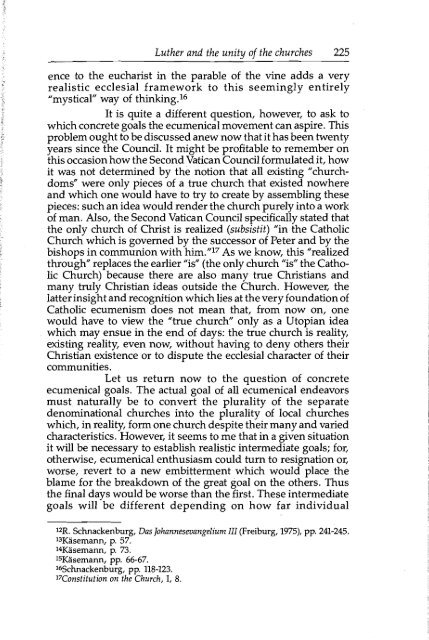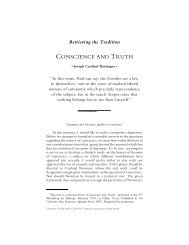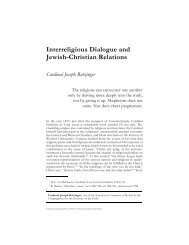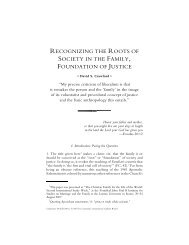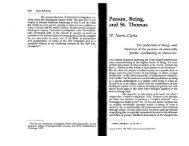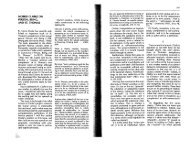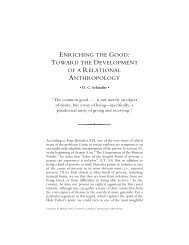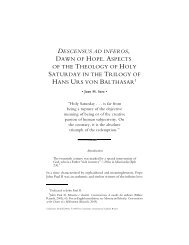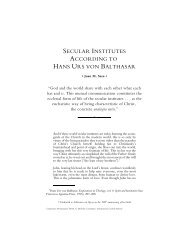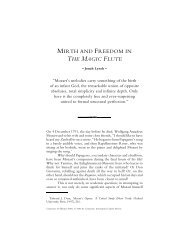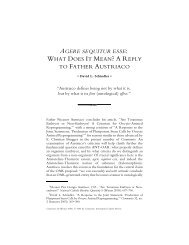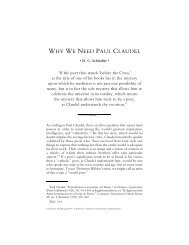Joseph Ratzinger. Luther and the Unity of the Churches. Communio ...
Joseph Ratzinger. Luther and the Unity of the Churches. Communio ...
Joseph Ratzinger. Luther and the Unity of the Churches. Communio ...
You also want an ePaper? Increase the reach of your titles
YUMPU automatically turns print PDFs into web optimized ePapers that Google loves.
<strong>Lu<strong>the</strong>r</strong> <strong>and</strong> <strong>the</strong> unity <strong>of</strong> <strong>the</strong> churches 225<br />
ence to <strong>the</strong> eucharist in <strong>the</strong> parable <strong>of</strong> <strong>the</strong> vine adds a very<br />
realistic ecclesial framework to this seemingly entirely<br />
"mystical" way <strong>of</strong> thinking.16<br />
It is quite a different question, however, to ask to<br />
which concrete goals <strong>the</strong> ecumenical movement can aspire. This<br />
problem ought to be discussed anew now that it has been twenty<br />
years since <strong>the</strong> Council. It might be pr<strong>of</strong>itable to remember on<br />
this occasion how <strong>the</strong> Second Vatican Council formulated it, how<br />
it was not determined by <strong>the</strong> notion that all existing "churchdomsl'<br />
were only pieces <strong>of</strong> a true church that existed nowhere<br />
<strong>and</strong> which one would have to try to create by assembling <strong>the</strong>se<br />
pieces: such an idea would render <strong>the</strong> church purely into a work<br />
<strong>of</strong> man. Also, <strong>the</strong> Second Vatican Council specifically stated that<br />
<strong>the</strong> only church <strong>of</strong> Christ is realized (subsistit) "in <strong>the</strong> Catholic<br />
Church which is governed by <strong>the</strong> successor <strong>of</strong> Peter <strong>and</strong> by <strong>the</strong><br />
bishops in communion with him."17 As we know, this "realized<br />
through replaces <strong>the</strong> earlier "is" (<strong>the</strong> only church "is" <strong>the</strong> Catholic<br />
Church) because <strong>the</strong>re are also many true Christians <strong>and</strong><br />
many truly Christian ideas outside <strong>the</strong> Church. However, <strong>the</strong><br />
latter insight <strong>and</strong> recognition which lies at <strong>the</strong> very foundation <strong>of</strong><br />
Catholic ecumenism does not mean that, from now on, one<br />
would have to view <strong>the</strong> "true church only as a Utopian idea<br />
which may ensue in <strong>the</strong> end <strong>of</strong> days: <strong>the</strong> true church is reality,<br />
existing reality, even now, without having to deny o<strong>the</strong>rs <strong>the</strong>ir<br />
Christian existence or to dispute <strong>the</strong> ecclesial character <strong>of</strong> <strong>the</strong>ir<br />
communities.<br />
Let us return now to <strong>the</strong> question <strong>of</strong> concrete<br />
ecumenical goals. The actual goal <strong>of</strong> all ecumenical endeavors<br />
must naturally be to convert <strong>the</strong> plurality <strong>of</strong> <strong>the</strong> separate<br />
denominational churches into <strong>the</strong> plurality <strong>of</strong> local churches<br />
which, in reality, form one church despite <strong>the</strong>ir many <strong>and</strong> varied<br />
characteristics. However, it seems to me that in a given situation<br />
it will be necessary to establish realistic intermediate goals; for,<br />
o<strong>the</strong>rwise, ecumenical enthusiasm could turn to resignation or,<br />
worse, revert to a new embitterment which would place <strong>the</strong><br />
blame for <strong>the</strong> breakdown <strong>of</strong> <strong>the</strong> great goal on <strong>the</strong> o<strong>the</strong>rs. Thus<br />
<strong>the</strong> final days would be worse than <strong>the</strong> first. These intermediate<br />
goals will be different depending on how far individual<br />
12R. Schnackenburg, Das Johannesevangelium I11 (Freiburg, 1975), pp. 241-245.<br />
13Kasemann, p. 57.<br />
14Kasemann, p. 73.<br />
15Kasemann, pp. 66-67.<br />
IsSchnackenburg, pp. 118-123.<br />
17Constitution on <strong>the</strong> Church, I, 8.


